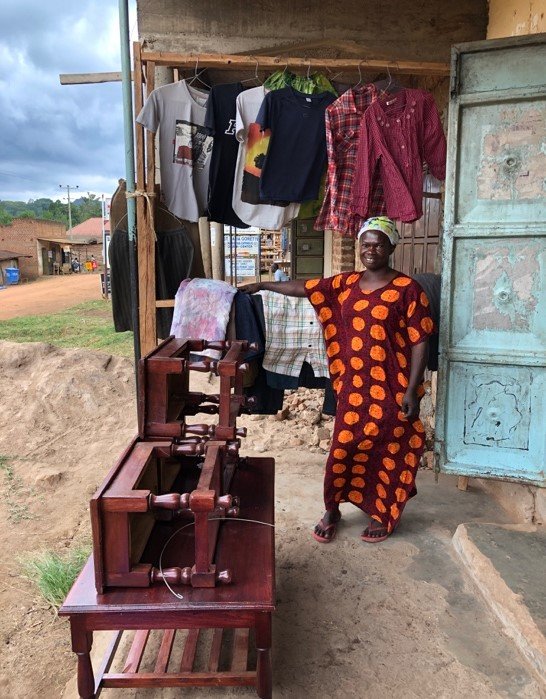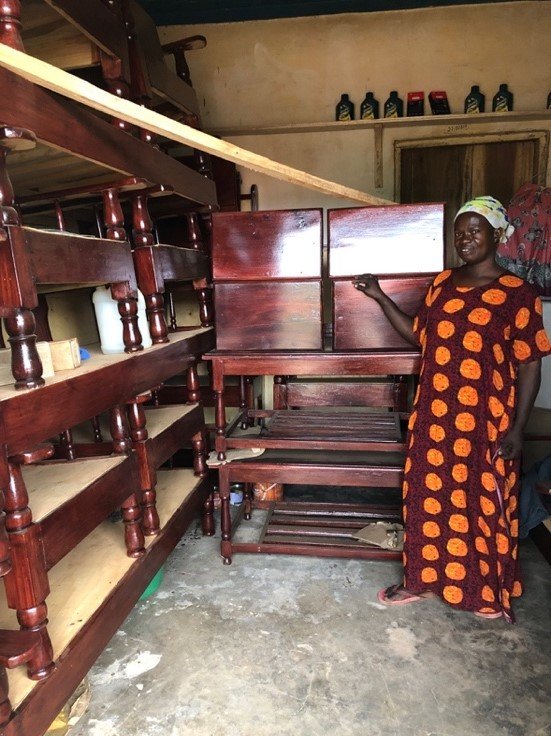By Will Kuenster | WMI Intern
Before receiving a loan from WMI, Rosi and her family were struggling to make ends meet. She didn’t have any business to speak of and was trying to support 3 children and a family member who is HIV positive. She would spend most of the day just sitting around the house after completing her morning garden work. In 2015, when a neighbor told her about the opportunity for a WMI loan, a vision for a business formed in her head.
With the initial funds, she began to make and sell mandazi, a Ugandan baked good resembling a doughnut, but with less sugar. She would bring a fresh batch to the Buyobo trading center every morning and before long was selling out while putting smiles on her customer’s faces.
After this initial success, Rosi decided to expand and diversify her business. Her husband is a skilled craftsman, so the two of them teamed up to make and sell furniture. Their venture began by making “commissioned” pieces. This was somewhat successful, but their customers wished they could see the item beforehand and didn’t always trust that the money was being used properly.
In response, Rosi and her husband decided to make furniture in advance, build some inventory, and open up a storefront in the trading center. This has proven to be a win-win proposition for the business; the customers can assess product quality before their purchase, and making multiple pieces at a time gives the business scale, lowering input costs while improving production efficiency.
Rosi’s product line has continued to expand beyond furniture and mandazi. She now sells a selection of clothing and small savings boxes (similar to piggy banks) that have become popular.
Rosi has developed a sharp business sense in her 4 years as a shop owner, incrementally improving her cash flow through new products and strict credit terms. Because she only sells about 1 piece of furniture per week (usually 5 per month), she has continued to expand her product line to supplement the furniture income. She still makes and sells out of the mandazi every morning, and now offers a selection of clothing and savings boxes. The higher inventory turnover of these items generates enough income to pay for small daily expenses to support her family.
Rosi employs two people: her husband, who makes the furniture, and her 19-year-old son, who runs the shop on weekends. Rosi struggles with writing, so her son also assists her by keeping the books for the business. With the profits she is generating, Rosi first pays back the WMI loan, then pays for her children’s school fees, and finally saves the rest or puts it back into the business. She’s currently saving for a truck so she can control wood deliveries and cut out the middlemen.
The financial inclusion provided by WMI has had an overwhelmingly positive impact on Rosi’s ability to support her family, her personal quality of life, and her view of herself. Since she opened her business, she has never struggled to pay for school fees or meals, something that was commonplace beforehand. She has been able to afford transforming her home from a semi-permanent home to a permanent home and now sleeps on a nice, comfortable bed.
Rosi has also been able to afford the necessary care for the member of her family who is HIV positive. The medicine for HIV is available free of charge, but the individual would have to walk miles to pick it up, which was extremely tiring, given their health. But now, they are able to afford transport by boda-boda (motorbike), making the medicine much easier to access.
Lastly, WMI has had a tremendous impact on her self-belief and efficacy. Rosi used to spend all day hanging around the house and working in the family garden without any other options. Now, she is very busy and feels much more productive. When asked what her favorite part about her work is, Rosi, grinning ear to ear, said, “Each day, after I have sold my last piece of mandazi, I can relax and feel very accomplished and proud.”
Rosi makes us all proud! Won’t you help her and women like her? Your generosity and consideration in choosing to support WMI is giving African women the chance to work their way out of poverty and stay out of poverty. Every contribution, every act of kindness, every outreach gesture is gratefully received and put to good use.
Project reports on GlobalGiving are posted directly to globalgiving.org by Project Leaders as they are completed, generally every 3-4 months. To protect the integrity of these documents, GlobalGiving does not alter them; therefore you may find some language or formatting issues.
If you donate to this project or have donated to this project, you can receive an email when this project posts a report. You can also subscribe for reports without donating.
Support this important cause by creating a personalized fundraising page.
Start a Fundraiser
